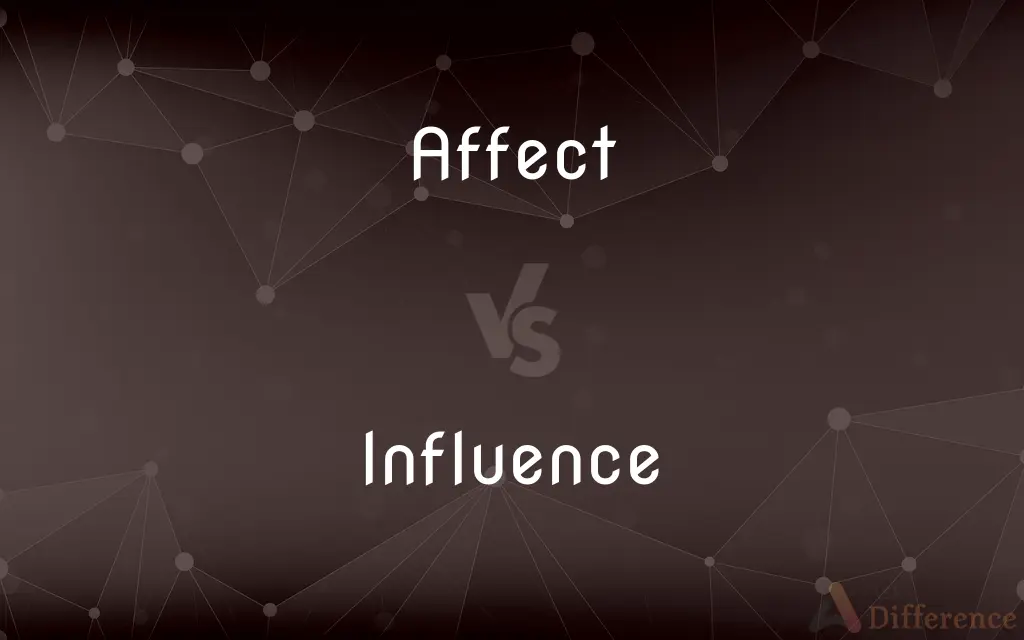Affect vs. Influence — What's the Difference?
By Tayyaba Rehman — Updated on November 6, 2023
Affect involves directly causing a change or difference in something or someone, while influence is the ability to indirectly shape someone's character, behavior, or development.

Difference Between Affect and Influence
Table of Contents
ADVERTISEMENT
Key Differences
Affect generally refers to an immediate and observable change or reaction in a person or thing due to an external stimulus. Influence, on the other hand, describes the power or capacity to cause gradual, often indirect, effects on the character, behavior, or development of someone or something. Both affect and influence can change outcomes, but affect often implies a direct and immediate impact, while influence suggests a more subtle and possibly long-term effect.
The term affect can also denote an emotion or desire, especially as influencing behavior or action. Influence does not pertain to emotions but rather the ability to shape outcomes, opinions, or decisions through indirect pressure, persuasion, or leadership. When someone's mood is described as affected, it is their immediate emotional state that is being discussed, whereas someone's influence would refer to their overarching impact on others' emotions or actions.
In psychology, affect is used to describe an observed expression of emotion, while influence is not typically used in this context. A therapist might assess a patient's affect during a session to gauge their emotional state. Conversely, a therapist might work to exert positive influence on a patient's coping mechanisms over time. Here, affect is the visible manifestation of feelings, whereas influence is the guiding force that might shape future emotional responses.
While affect is primarily a verb, it also exists as a noun in the realm of psychology, referring to observable manifestations of emotion. Influence functions both as a noun and a verb, but its meaning does not significantly change with its grammatical role. When used as a noun, influence still indicates the power to change or affect someone or something, whereas as a verb, it describes the action of exerting that power.
In terms of linguistic usage, affect as a verb is often confused with effect, which is mainly a noun. Influence, however, does not share this kind of common confusion in terms of word form and is consistently used across various contexts. For example, weather can affect travel plans (verb), but cannot be an effect (noun). A person's advice can influence decisions (verb) and that person can have an influence on decision-making processes (noun).
ADVERTISEMENT
Comparison Chart
Part of Speech
Primarily used as a verb, occasionally as a noun in psychology.
Used as both a noun and a verb.
Immediate vs Long-term
Implies an immediate response or change.
Implies a potential for causing gradual change over time.
Emotion vs Power
As a noun in psychology, it refers to an emotion.
Refers to the capacity or power to shape outcomes.
Direct vs Indirect
Direct impact on something or someone.
Often an indirect or persuasive effect on something or someone.
Usage Confusion
Often confused with "effect," which is primarily a noun.
Less confusion in usage; more straightforward in terms of grammatical function.
Compare with Definitions
Affect
(Verb) To pretend to have or feel something
She affected indifference, even though she was upset.
Influence
(Noun) The capacity to be a compelling force on actions
His mentorship held a strong influence on my career.
Affect
(Noun, Psychology) Observable emotional response
The patient's flat affect was concerning to the therapist.
Influence
(Verb) To have an effect on the character, development, or behavior of someone
Parents greatly influence their children.
Affect
To have an influence on or effect a change in
Inflation affects the buying power of the dollar.
Influence
(Noun) An ethereal fluid thought to flow from the stars
Ancient astrologers believed in the influence of the planets.
Affect
To act on the emotions of; touch or move.
Influence
A power affecting a person, thing, or course of events, especially one that operates without any direct or apparent effort
The pervasive influence that TV has on modern life.
Young people falling under the influence of a radical philosopher.
Affect
To attack or infect, as a disease
Rheumatic fever can affect the heart.
Influence
Power to sway or affect based on prestige, wealth, ability, or position
Used her family's influence to get the job.
Affect
To put on a false show of; simulate
Affected a British accent.
Influence
A person who exerts such power
My parents considered my friend to be a bad influence on me.
Affect
To have or show a liking for
Affects dramatic clothes.
Influence
A determining factor believed by some to affect individual tendencies and characteristics understood to be caused by the positions of the stars and planets at the time of one's birth.
Affect
(Archaic) To fancy; love.
Influence
Factors believed to be caused by the changing positions of the stars and planets in relation to their positions at the time of one's birth.
Affect
To tend to by nature; tend to assume
A substance that affects crystalline form.
Influence
To have an influence on (something); change
A news report that influenced the outcome of the election.
Affect
To imitate; copy
"Spenser, in affecting the ancients, writ no language" (Ben Jonson).
Influence
To change the behavior or thinking of (someone); sway
Negative ads that are intended to influence voters.
Affect
Feeling or emotion, especially as manifested by facial expression or body language
"The soldiers seen on television had been carefully chosen for blandness of affect" (Norman Mailer).
Influence
The power to affect, control or manipulate something or someone; the ability to change the development of fluctuating things such as conduct, thoughts or decisions.
I have absolutely no influence over him.
Affect
(Obsolete) A disposition, feeling, or tendency.
Influence
An action exerted by a person or thing with such power on another to cause change.
I'm not able to exercise influence over him.
Affect
(transitive) To influence or alter.
The experience affected me deeply.
The heat of the sunlight affected the speed of the chemical reaction.
Influence
A person or thing exerting such power or action.
He has been a great influence on the voters during the elections.
Affect
(transitive) To move to emotion.
He was deeply affected by the tragic ending of the play.
Influence
(astrology) An element believed to determine someone's character or individual tendencies, caused by the position of the stars and planets at the time of one's birth.
Affect
Of an illness or condition, to infect or harm (a part of the body).
Hepatitis affects the liver.
Influence
(obsolete) The action of flowing in; influx.
Affect
To dispose or incline.
Influence
(electricity) Electrostatic induction.
Affect
To tend to by affinity or disposition.
Influence
(transitive) To have an effect on by using gentle or subtle action; to exert an influence upon; to modify, bias, or sway; to persuade or induce.
The politician wants to influence the public.
I must admit that this book influenced my outlook on life.
Affect
To assign; to appoint.
Influence
(intransitive) To exert, make use of one's influence.
Affect
To burden (property) with a fixed charge or payment, or other condition or restriction.
Influence
To cause to flow in or into; infuse; instill.
Affect
(transitive) To make a show of; to put on a pretense of; to feign; to assume. To make a false display of.
To affect ignorance
To affect a British accent
He managed to affect a smile despite feeling quite miserable.
Influence
A flowing in or upon; influx.
God hath his influence into the very essence of all things.
Affect
To aim for, to try to obtain.
Influence
Hence, in general, the bringing about of an effect, physical or moral, by a gradual process; controlling power quietly exerted; agency, force, or tendency of any kind which affects, modifies, or sways; as, the influence which the sun exerts on animal and vegetable life; the influence of education on the mind; the influence, according to astrologers, of the stars over affairs.
Astrologers call the evil influences of the stars, evil aspects.
Canst thou bind the sweet influences of Pleiades, or loose the bands of Orion?
She said : "Ah, dearest lord! what evil starOn you hath frown'd, and poured, his influence bad?"
Affect
To feel affection for (someone); to like, be fond of.
Influence
Power or authority arising from elevated station, excelence of character or intellect, wealth, etc.; reputation; acknowledged ascendency; as, he is a man of influence in the community.
Such influence hath your excellency.
Affect
To show a fondness for (something); to choose.
Influence
Induction.
Affect
(psychology) A subjective feeling experienced in response to a thought or other stimulus; mood, emotion, especially as demonstrated in external physical signs.
Influence
To control or move by power, physical or moral; to affect by gentle action; to exert an influence upon; to modify, bias, or sway; to affect; to move; to persuade; to induce.
These experiments succeed after the same manner in vacuo as in the open air, and therefore are not influenced by the weight or pressure of the atmosphere.
This standing revelation . . . is sufficient to influence their faith and practice, if they attend.
The principle which influenced their obedience has lost its efficacy.
Affect
(obsolete) One's mood or inclination; mental state.
Influence
A power to affect persons or events especially power based on prestige etc;
Used her parents' influence to get the job
Affect
(obsolete) A desire, an appetite.
Influence
Causing something without any direct or apparent effort
Affect
To act upon; to produce an effect or change upon.
As might affect the earth with cold heat.
The climate affected their health and spirits.
Influence
A cognitive factor that tends to have an effect on what you do;
Her wishes had a great influence on his thinking
Affect
To influence or move, as the feelings or passions; to touch.
A consideration of the rationale of our passions seems to me very necessary for all who would affect them upon solid and pure principles.
Influence
The effect of one thing (or person) on another;
The influence of mechanical action
Affect
To love; to regard with affection.
As for Queen Katharine, he rather respected than affected, rather honored than loved, her.
Influence
One having power to influence another;
She was the most important influence in my life
He was a bad influence on the children
Affect
To show a fondness for; to like to use or practice; to choose; hence, to frequent habitually.
For he does neither affect company, nor is he fit for it, indeed.
Do not affect the society of your inferiors in rank, nor court that of the great.
Influence
Have and exert influence or effect;
The artist's work influenced the young painter
She worked on her friends to support the political candidate
Affect
To dispose or incline.
Men whom they thought best affected to religion and their country's liberty.
Influence
Shape or influence; give direction to;
Experience often determines ability
Mold public opinion
Affect
To aim at; to aspire; to covet.
This proud man affects imperial way.
Influence
Induce into action by using one's charm;
She charmed him into giving her all his money
Affect
To tend to by affinity or disposition.
The drops of every fluid affect a round figure.
Influence
(Noun) The power to shape policy or ensure favorable treatment
Her influence at the firm was undeniable.
Affect
To make a show of; to put on a pretense of; to feign; to assume; as, to affect ignorance.
Careless she is with artful care,Affecting to seem unaffected.
Thou dost affect my manners.
Influence
(Verb) To sway or affect by indirect action
The leader's speech influenced public opinion.
Affect
To assign; to appoint.
One of the domestics was affected to his special service.
Affect
Affection; inclination; passion; feeling; disposition.
Affect
The emotional complex associated with an idea or mental state. In hysteria, the affect is sometimes entirely dissociated, sometimes transferred to another than the original idea.
Affect
The conscious subjective aspect of feeling or emotion
Affect
Have an effect upon;
Will the new rules affect me?
Affect
Act physically on; have an effect upon
Affect
Connect closely and often incriminatingly;
This new ruling affects your business
Affect
Make believe with the intent to deceive;
He feigned that he was ill
He shammed a headache
Affect
Have an emotional or cognitive impact upon;
This child impressed me as unusually mature
This behavior struck me as odd
Affect
(Verb) To make a change or difference
The storm didn't affect our plans.
Affect
(Verb) To touch the feelings of; to move emotionally
The movie deeply affected him.
Affect
(Verb) To influence something, usually in context of a disease
The disease affects the nervous system.
Common Curiosities
What does it mean to influence someone?
To influence someone means to shape or guide their behavior or beliefs over time.
Can affect and influence be used interchangeably?
No, affect usually refers to an immediate reaction, whereas influence refers to the power to gradually shape outcomes.
Is affect only used as a verb?
Affect is primarily a verb, but it is also a noun in psychology, denoting an emotional state.
Can influence be used as a noun?
Yes, influence can be both a noun describing a power or effect and a verb meaning to exert that power.
Does affect imply a positive or negative change?
Affect can imply either positive or negative change and does not denote valence by itself.
What is the noun form of affect?
As a noun, affect is a term used in psychology to describe an observable emotion.
Is affect the same as emotion?
Affect can be an emotion or its expression, but it is not synonymous with emotion itself.
How do I know when to use affect or influence?
Use affect when referring to an immediate change or reaction; use influence when referring to the capacity to change or shape over time.
Is influence always intentional?
Influence can be both intentional and unintentional, depending on the context.
What is an example of affect in psychology?
An example is when a psychologist notes a patient's affect, like a joyful or sad demeanor, during an evaluation.
Does influence always require direct contact?
No, influence can occur through indirect means such as media, culture, or societal norms.
Can a person's affect be influenced?
Yes, a person's immediate affect can be influenced by various factors over time.
How can companies use influence?
Companies can use influence through marketing and branding to shape consumer preferences and behaviors.
How can a person have influence?
A person can have influence through authority, expertise, persuasion, or personal traits.
Can weather influence or affect my mood?
Weather can affect your mood (immediate change), and consistently dreary weather can influence your general outlook (gradual change).
Share Your Discovery

Previous Comparison
Dayana vs. Diana
Next Comparison
Give vs. TellAuthor Spotlight
Written by
Tayyaba RehmanTayyaba Rehman is a distinguished writer, currently serving as a primary contributor to askdifference.com. As a researcher in semantics and etymology, Tayyaba's passion for the complexity of languages and their distinctions has found a perfect home on the platform. Tayyaba delves into the intricacies of language, distinguishing between commonly confused words and phrases, thereby providing clarity for readers worldwide.















































